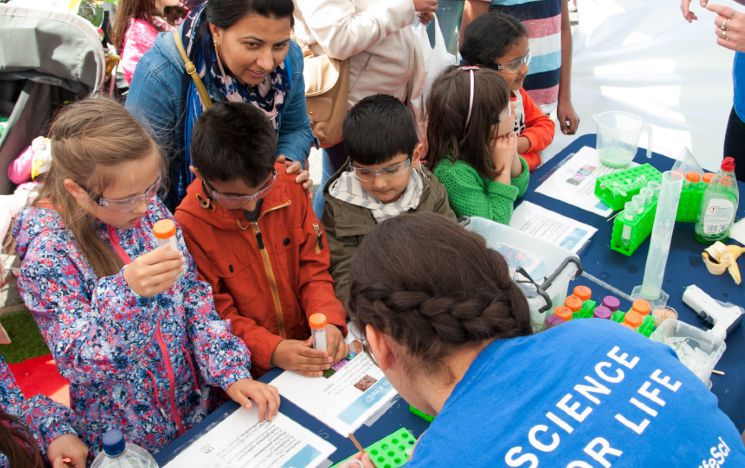Misfolding
Misfolding is a public engagement collaboration between the Centre for Research in Opera and Music Theatre and the Serpell Lab in the School of Life Sciences
From developing new medicines, to analysing the environment around us – we're making a difference to society. See how we are sharing our research and knowledge with the wider community.

The principal aim of public engagement within the School of Life Sciences is to connect with the people around us.
All of our research impacts on people's lives, whether it's developing new medicines, creating understanding of human processes, or analysing the environment around us. The public are integral to our research, and we want to share our knowledge and learn from others.
Explore our engagement highlights to understand how we connect with people, organisations and communities at a local, regional and international level.
Public engagement describes the myriad of ways in which the activity and benefits of higher education and research can be shared with the public. Engagement is by definition a two-way process, involving interaction and listening, with the goal of generating mutual benefit.” national coordinating centre for public engagement
As a signatory to the National Coordinating Centre's Manifesto for Public Engagement, the University uses this definition of engagement to frame the ways that we inform, consult and collaborate with the public.
Engagement is a two-way process, and there are a range of opportunities to get involved with our research and meet researchers.
Work with our researchers
We believe that anyone can contribute to cutting-edge research, not just scientists. We have a number of projects that you can get involved with:
Buzz Club: Be a pollinator researcher and help Professor Dave Goulson and his lab to better understand pollinating insects. The Buzz Club run a number of projects aiming to better understand and protect bees and other pollinators, including Hoverfly Lagoons (help design habitats for breeding hoverflies), Earwi'GO (create earwig 'hotels'), Strawberries Rock (a project which is looking in to a home remedy for pecked fruit) and more. Visit the Buzz Club for more information.
SPaRCS: Are you a Year 12 or Year 13 form student or teacher? Get hands-on lab experience as you help Dr Jon Baxter to unravel instability of chromosomes. Visit Schools Partnership Researching Chromosome Stability for more information.
Rewilding Sussex: This community group was set up by Dr Chris Sandom in 2014 to engage people with rewilding locally. They are always keen to hear from enthusiastic individuals who feel they can contribute in some way. Find out more about Rewilding Sussex.
Are you interested in meeting our researchers and learning from them as the best way to improve the environment or your health?
Talks: Our academics contribute to a number of local talk series and community groups, such as Cafe Scientifique and Sussex Universe.
Soapbox Science: The School of Life Sciences leads the Sussex team organising Soapbox Science Brighton, which was set up in 2017. Soapbox Science promotes women in STEM (science, technology, engineering and mathematics).
Misfolding: The project employs music, performance and digital arts to communicate these developments in brain science and dementia research in an imaginative and poetic way.
Dark Clouds Bright Skies: University of Sussex researchers, Dr Chris Sandom and Dr Joseph Walton along with Brighton based artist, Daniel Locke, took on the challenge to develop a 24-page comic in just 24 hours to illustrate what a sustainable future for the South Coast of England could look like by 2050.
We take part in a range of events local to Sussex, bringing interactive activities for everyone to get hands-on with. This include: The British Science Festival, Brighton Science Festival, Lewes STEM Fair, Big Bang East Sussex. If you would like our researchers to visit your event, contact lifesci@sussex.ac.uk
Our academics are committed to inspiring the next generation of scientists, and we spend time working with Sussex Widening Participation. Due to time and resource constraints we are unable to accommodate all requests for school visits.
Find out what do if you are interested in gaining work experience with us.
We are grateful to a number of charities who sponsor research within the School of Life Sciences. Our academics spend time engaging with the supporters of these charities, demonstrating where their funds go. Emeritus Professors Guy Richardson and Corne Kros shared their research with members of the public who have close personal connections to hearing loss, deafness or tinnitus at an Action on Hearing Loss event. We also run training with relevant charities, to support our academics engaging with their supporters.
If you have a question about our public engagement activities, get in touch: lifesci@sussex.ac.uk